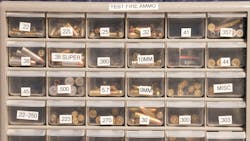How ATF Ballistic Database Helps Texas Police Solve Gun Violence Cases
By Maggie Prosser
Source The Dallas Morning News
LEWISVILLE, TX—In a nondescript Lewisville business park, ballistics evidence is processed in a lab tucked in the rear of an office building.
The whir of the camera makes the microscopic defects on the butt of a bullet casing look like static projected on a monitor. Each flash, zoom and jot captures a new angle of the casing’s unique markings.
These images are taken by machines no bigger than an early-2000s computer tower and uploaded to a decades-old database utilized by the Bureau of Alcohol, Tobacco, Firearms and Explosives. A computer software then pings potential matches to other cases based on distinctive, fingerprint-like markings left on a casing ejected from the barrel of a semi-automatic gun.
ATF’s National Integrated Ballistic Information Network stores millions of pieces of ballistics intelligence that can help law enforcement generate investigative leads, said Cody Sorrells, who leads ATF Dallas’ Crime Gun Enforcement Team.
“The idea is to put those pieces of the puzzle together,” Sorrells said. “We gather all that intelligence and put all that together to try to identify and target serial shooters, as well as the source of those guns.”
There are nearly 260 NIBIN sites across the country, including the ATF Dallas campus, according to the agency’s website.
The ATF Dallas NIBIN site entered more than 3,600 cartridge cases from Jan. 1 to Nov. 21 this year, resulting in 513 leads, ATF Dallas spokeswoman Sara Abel said. In that same time period, about 490,000 acquisitions have been uploaded nationwide, generating 150,000 leads, Abel said.
Sorrells’ team loads evidence collected from across Dallas-Fort Worth crime scenes, as well as test fires weapons to see if the casing — with its specific firing pin impression, scrapes and ejector mark invisible to the naked eye — match other cases. An in-house technician then reviews computer-generated matches, and their analysis is double-checked by technicians at a lab in Alabama, he said.
Sorrells said about 10% of NIBIN entries nationwide result in a lead. His team reviews about 50 NIBIN leads a week and on average about 10 are viable, he said. Those leads are relayed to local law enforcement or investigated by federal agents.
“NIBIN is an amazing piece of technology … but it is just a tool,” Abel said. “The investigators, the agents, the agencies that we’re working with — the partnerships — are what get the cases closed.”
North Texas case
Police arrested a man on suspicion of murder earlier this year after NIBIN and investigators linked two seemingly unrelated cases of gun violence: a slaying at a Dallas homeless encampment and an accidental shooting in Lewisville.
Laquavana Goode, 29, was indicted in the death of Lonnie Lewis, according to court records. The 62-year-old was found fatally shot July 25, 2021, under a bridge on the border of Deep Ellum and South Dallas, The Dallas Morning News previously reported.
Goode is accused of intentionally shooting five times into the homeless camp. In January, Goode was parked at a Walmart in Lewisville when he accidentally shot himself in the knee and called police for help, the affidavit says.
The case is pending, according to Dallas County court records. A lawyer listed in court records for Goode could not be reached for comment.
“What’s huge is the big picture,” ATF Dallas Acting Special Agent in Charge James VanVliet said. “What you’re doing in town or City A … could potentially impact or solve that crime in City B. It is that greater goal of unified purpose across jurisdictions.”
Pilot program
Arlington police announced this fall a pilot initiative that innovates the longstanding national evidence database to link crimes and aggressively chase suspected shooters.
The NIBIN Engagement Team, or NET, formed in late July and has led to 25 arrests in Arlington cases and spurred more than 320 leads as of October, the department said at the time.
Arlington police have used NIBIN for more than a decade, but the new program is solely dedicated to pursuing investigative leads. The program could also help other police Dallas-Fort Worth agencies, and the unit has passed along information to other police departments, authorities said.
The pilot program will last until January. Then the department will assess its success and decide whether to make the program permanent, police Chief Al Jones said.
________
©2022 The Dallas Morning News.
Visit dallasnews.com.
Distributed by Tribune Content Agency, LLC.



